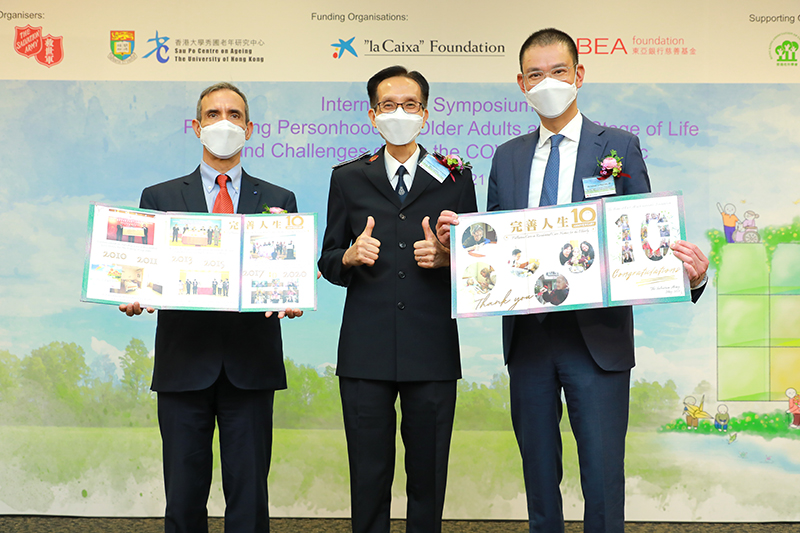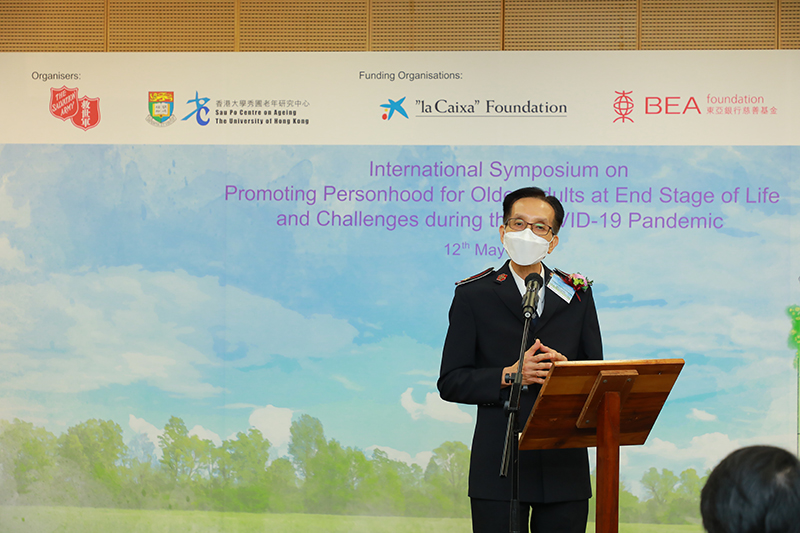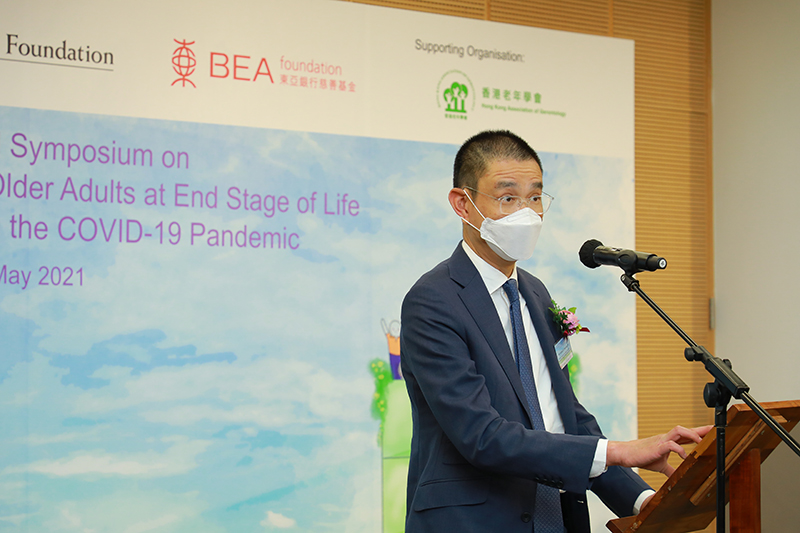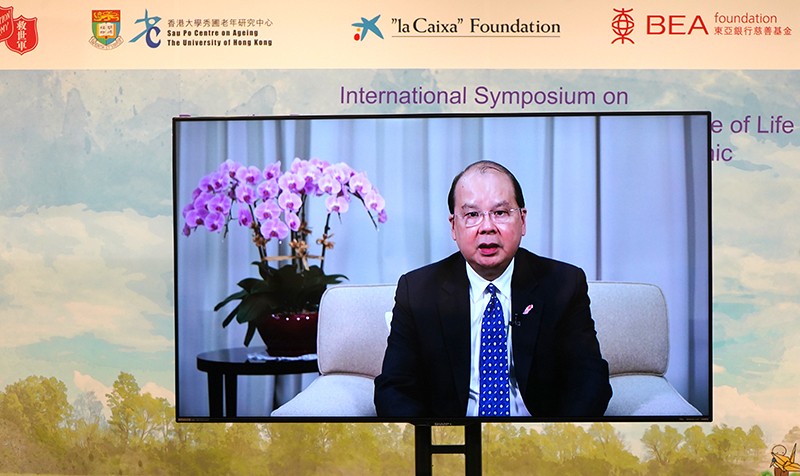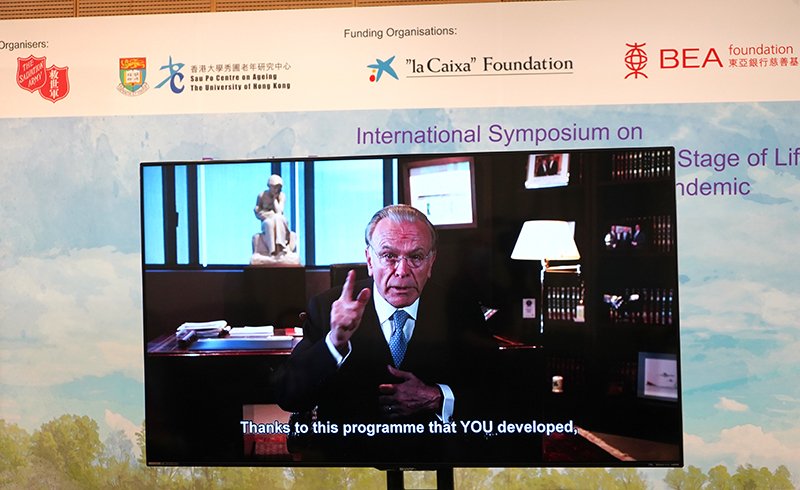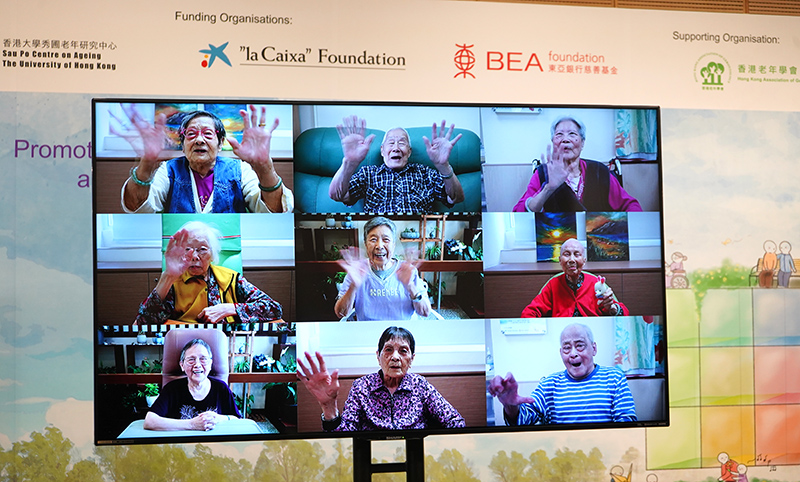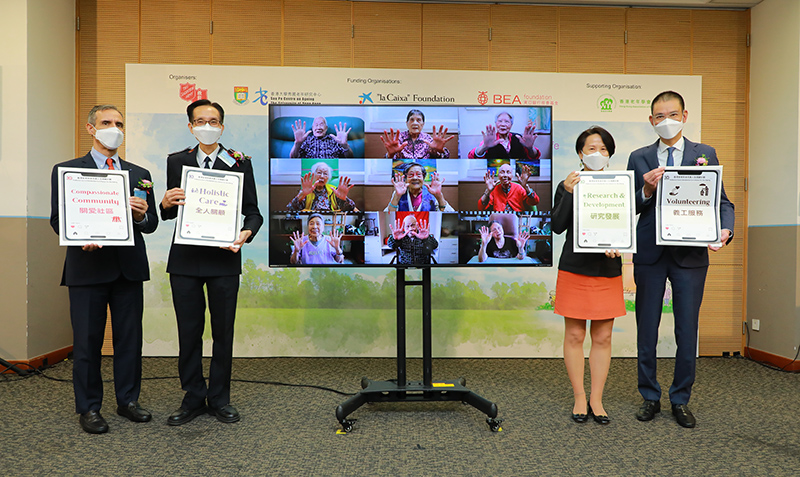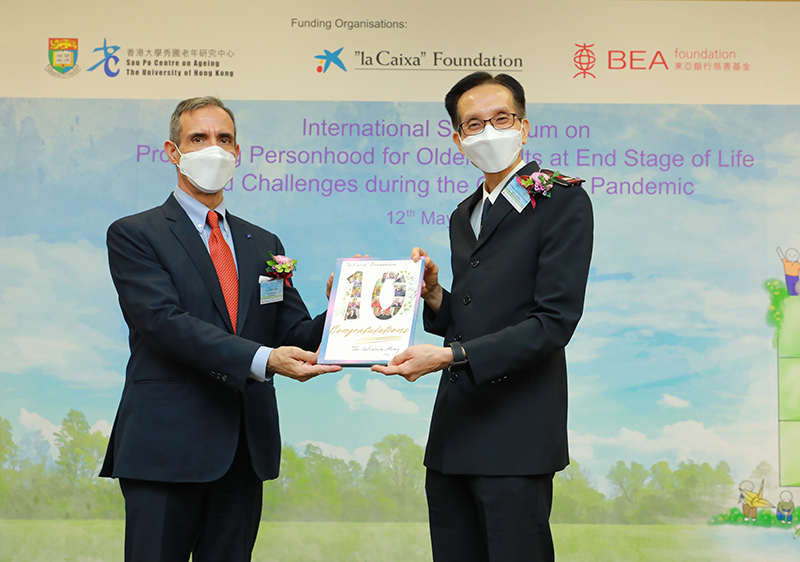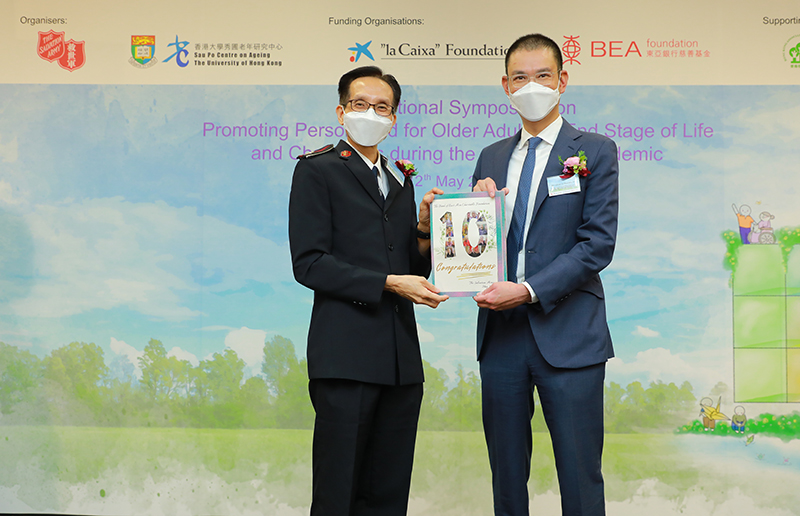With the support from ”la Caixa” Foundation and The Bank of East Asia (BEA), The Salvation Army ‘Palliative Care in Residential Care Homes for the Elderly’ (the programme) has been promoting palliative care service throughout the years. As the programme enters its 10th anniversary, The Salvation Army co-organised ‘International Symposium on Promoting Personhood for Older Adults at End Stage of Life (CORE-UPHOLD Model) and Challenges during the COVID-19 Pandemic’ with Sau Po Centre on Ageing of The University of Hong Kong on May 12, inviting professionals worldwide to share their expertise and how they overcome the challenges in the pandemic.
Emphasise personhood in palliative care service and the challenges in the pandemic
Elderly may suffer from chronic illnesses when they age. These include cognitive decline, slower responses and decline in ability to express emotions, and more, all of which pose challenges to caregivers of the elderly. Based on their experience, The Salvation Army ‘Palliative Care in Residential Care Homes for the Elderly’ and The University of Hong Kong developed the ‘CORE-UPHOLD Model’ in 2018 (as per attached), which is supported by scientific research and emphasises the elderly as an individual. The model aims to help provide the proper end-of-life care that corresponds to the needs of the elderly and his family by recovering the elderly’s unique personhood, including his experience, personality and character traits, with comprehensive assessment and psychological support.
In the past year, however, the pandemic hindered the communication between elderly who lives in residential care homes and their families and presented challenges to both parties. Nevertheless, the palliative care team works diligently and continues the support to the residential care homes and the elderly’s families with the ‘CORE-UPHOLD Model’. By adopting the model, the programme fully evaluates the elderly’s needs and gives them support in more flexible and innovative ways. In the symposium, Social workers of The Salvation Army and scholars of The University of Hong Kong discussed the model, shared some cases, and pointed out the importance of the elderly’s personhood in palliative care.
Achievement Recognised
In the symposium, Mr Matthew Cheung Kin-chung, Chief Secretary for Administration of the Government of the Hong Kong Special Administrative Region, congratulated the programme on the achievements. He said, ‘Hong Kong has been hard hit by the pandemic and the whole society suffers from the illness and the economic fallout. While we have tried our best to tackle the immediate problems facing us, we have not lost sight of our medium term endeavours to address the problems arising from an ageing population. To this end, we conducted a public consultation to gauge public views on proposals to develop a clear and consistent legal framework for advance directives. I am pleased to note that we have garnered widespread support from the consultation.’
Lieut-Colonel Bob Lee, Officer Commanding of The Salvation Army Hong Kong and Macau Command, appreciated the continuous support from ”la Caixa” Foundation and The Bank of East Asia over the past 10 years. He said, ‘The road in trying out a model in residential care homes and demonstrating a change of practice is never easy. I am deeply touched by our tremendous work partners who have done such a great job over the past 10 years. Their contribution is important in paving the way to the development of a locally adapted care pathway and the “CORE-UPHOLD Model” in the residential care homes.’
“We hope this Symposium will provide a useful forum to share knowledge, experience and best-practices that will drive the future development of palliative care in the wider region.” said Mr Adrian Li, Director of BEA Foundation and Co-Chief Executive at BEA. “We are sure that, by working together, we can ease suffering and bring hope and dignity to those in their final years.”
Dr. Isidro Fainé, Chairman of the Board of Trustees of ”la Caixa” Foundation congratulated the programme on the achievements and encouraged them to continue with their work, which has proven to be even more necessary in these times of the pandemic, with professionalism and commitment. He added, ‘The dedication that this Programme has demonstrated over the past 10 years, and continues to demonstrate each and every day, is the basis for the success of a programme that aspires to contribute to humanising end-of-life processes.’
Since 2010, The Salvation Army ‘Palliative Care in Residential Care Homes for the Elderly’ aims to initiate changes in the practice of care of the terminally ill in residential care homes. The programme supports with services including early intervention, end-of-life care, support to fulfill one’s wish, and more. With these, a holistic care will be delivered to participating residents. Entering its phase four, the programme continues to promote and expand the palliative care model that can be adapted by the local residential care service.
About ‘Palliative Care and Resident Care Homes for the Elderly’
With funding support from ”la Caixa” Foundation and The Bank of East Asia Charitable Foundation, The programme promotes palliative care and end-of-life care since 2010. It supports with services including early intervention, end-of-life care, support to fulfill one’s wish, and more. With these, a holistic care will be delivered to participating residents. In addition, the programme strengthens interaction and collaboration between the medical sector and residential care homes, optimises service operations, raises public awareness and accumulates knowledge and experience to advocate the incorporation of end-of-life care into routine services.
Cases shared by The Salvation Army ‘Palliative Care in Residential Care Homes for the Elderly’ (hereinafter known as of palliative care team in below)
1. A male resident who aged 100 has been living in the Salvation Army residential homes for almost 30 years. In recent years, he suffered from dementia and anemia. Since he often lost consciousness in the past 3 years, he had to visit the hospital frequently. In the time of pandemic, he was required to quarantine. Since his case was transferred to the palliative care team for medical and psychological support, the frequency for him to visit the hospital has reduced. Since his children had not been able to visit him for almost a year in the pandemic, they felt sad when they saw their father not being in a good shape in their first virtual meeting. His residential home and the team then began to study the resident’s personhood through ‘CORE-UPHOLD Model’. At the same time, the social workers helped his children to recall the moments with their father, which include preparing some personalised sensory stimulating activities like having pu-erh tea with him at his bedside, enjoy some ‘dim sum’, imagining eating beef pan-fried noodle, watching a football match, and more. These activities helped the children to re-create precious moments with their father in his late stage of life.
2. Because of the pandemic, the wife has been separated from her husband who lives in the residential care home. After a while, the residential home noticed the wife has been experiencing severe anxiety. Her negative thoughts had overwhelmed her. For instance, she worried her husband would feel being abandoned; her home-made soup was ‘useless’; the fear of receiving a call from the residential care home as it indicated that her husband was being hospitalised. The residential care home transferred their case to the palliative care team, hoping early intervention could help them to learn more about the need of planning for end-of-life and release their stress. The team had summarised 3 core parts with the ‘CORE-UPHOLD Model’, which included helping to ease the wife’s anxiety; arrangement for the wife to visit the neighbourhood of their former home to reminisce the sweet moments with her husband; taping a vlog and delivering it to the husband. With all these, the bond between the couple was redeveloped. Last but not least, the team kept the high level of the carer (the wife)’s involvement in the receiver (the husband), and gave recognition and encouragement at the same time. These all helped resolve her anxiety from not being able to visit during the time of pandemic.



